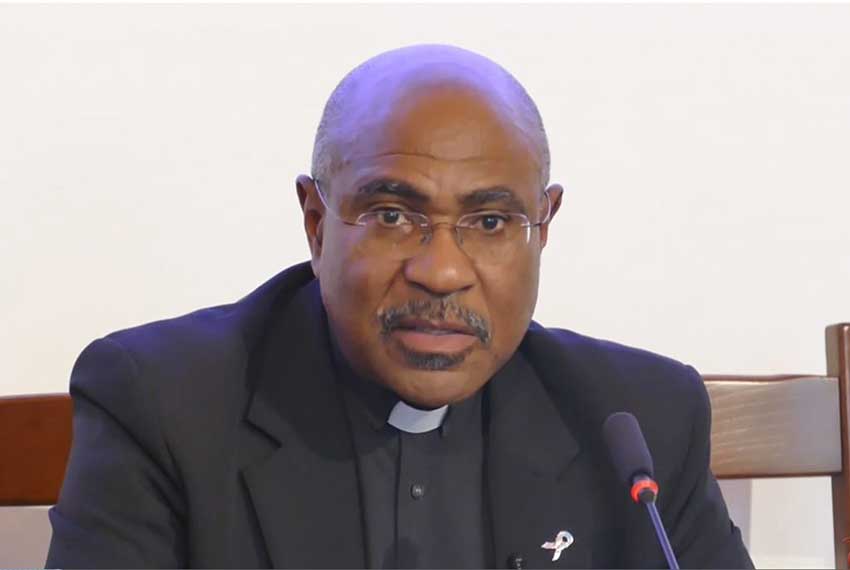“DO you not know that I have power to release you, and power to crucify you?” Jesus answered him, “You would have no power over me, if it had not been given you from above; therefore He who delivered me to you has the greater sin.” Jn.19:10-11.

The French existentialist Gabriel Marcel once remarked that all temptation may well be a temptation towards power – the immoral use of power to control others. While this temptation is confronted at various points in human history, both collective and individual, it has perhaps never been more dramatically and poignantly staged as when the “powerless” Christ stands before Pontius Pilate, the “powerful” Roman procurator. Pilate is aware of Christ’s innocence; he is aware of the malice of Christ’s enemies; he is aware of Christ’s kingship; and he is aware he has power of life and death over Christ. He was probably not aware that he was facing, like no one else before him and no one since, the temptation towards the exercise of absolute power. Never before or since has the maxim “power corrupts and absolute power corrupts absolutely” been more true than at this tribunal.
Christ on the other hand, having total self-mastery, had freely and willingly submitted Himself (Mt.26:53) into the power of His enemies: “No one takes my life from me, but I lay it down of my own accord.” (Jn.10:18). He submitted to death so that, through Him, many might have life. (Jn.12:24) He made no defence (Is.53:7) for His works were eloquent and sufficient testimony of who He was and what He was about (Jn.5:36). His silence, therefore, was not one of guilt but of innocence; not of self-condemnation, but of compassion, not of scorn but of willingness to suffer for the sins of others. He was aware that His was a mission of redeeming love incarnated in the maxim “love redeems and absolute love redeems absolutely.” (1Pet.1:18-19).
Man’s basic strength lies in his power of love. Conversely, his radical weakness resides in his love of power. The power of love, exercised by fully embracing man’s psychological, moral, and religious nature, affirms the good that lies in the worse of us; the love of power, through negation, seeks to destroy the good by levelling all to mediocrity. The confrontation between Christ and Pilate is the archetypal icon of the juxtaposition of the power of love and the love of power, remaining ever new and valid for individuals and societies, and perhaps never more so than today.
In the person of the unborn child, Christ again stands before Pilate who says: “Do you not know that I have power to release you, and power to abort you?” The unborn child, like Christ, is innocent, is destined to inherit a kingdom, and is beset by enemies. His enemies are those of his own household – his mother whose lifestyle, it is claimed, he threatens; whose career goals he jeopardizes; whose relationships he invades; whose sin he exposes; whose mental health he endangers – his father whose frivolousness, immaturity and callousness he exposes; whose freedom he threatens; whose mistake he is – the lawmakers who heartlessly refuse him his right to the protection of the law; – the doctors who, betraying the Hippocratic oath, betray themselves, their profession, life and the unborn child, even while being enriched by his death; – the society whose silence leaves no choice except that, for the convenience and benefit of others, the unborn child must be denied his right to life. In this case, who has the greater sin? The lawmakers who betrayed and handed over the unborn child? Or the father who by denying him betrayed him? Or the society that does not care enough to say no? Let each examine his conscience before God.
Love and power are polarities in man’s psychological, moral, and religious nature. They are necessarily incompatible. Love for another requires renunciation of power over the other; even to the point of death: “A man can have no greater love than to lay down his life for his friend” (Jn.15:13). The desire for power over another, however, crystallises into the renunciation of love. Joseph’s brothers are case in point (Gn.37) in that they planned his death when he fell into their power, whereas he liberated them when they were in his power (Gn.45). The tragedy of our time is our lovelessness: we are here because our parents loving us renounced power over us when we were in their power. Many unborn children today, like Jesus before Pilate, are not all as fortunate and so are sacrificed to the god of expediency. “Where love rules,” wrote Carl Jung, “there is no will to power; and where power predominates, there love is lacking. The one is the shadow of the other.” At the end of the day, however, it will be found that the choice was really between having the greater love or the greater sin.
God so loved the world that He gave His only Son by whose death life is given to those who with greater love lay down their life for others. The annual March for Life will take place next Saturday, in Castries, just before Holy Week, during which we should reflect on the import of Our Saviour standing before Pilate, of God standing before man, of our Creator standing before His creature. The March will be an opportunity for all those who are on the side of life to witness publicaly against violence of any kind, whether towards the unborn or the already born. May our witness at the March offer such hope to our society that all may fully understand that the power of love is not only greater than the love of power but, also and above all, it is life giving.





![Simón Bolívar - Liberator of the Americas [Photo credit: Venezuelan Embassy]](https://thevoiceslu.com/wp-content/uploads/2025/12/Simon-Bolivar-feat-2-380x250.jpg)



